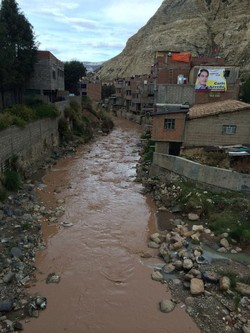Presbyterians recently had a front-row seat in the international discussion on climate change in Peru. The Presbyterian Hunger Program hosted a reflection-action trip with its partner, the Joining Hands Network, coinciding with the United Nations’ Climate Change Conference in Lima.
Joining Hands is an ecumenical and democratic network established by 20 organizations and churches across Peru. Its goal is to improve the quality of life for the most economically disadvantaged sectors of the Peruvian population.
“Our visit gave Presbyterians who are committed to environmental, energy, and climate justice an opportunity to learn about the realities connected to climate change, extractive industries, and the root causes of hunger, poverty, and environmental destruction,” says Rebecca Barnes, Associate for Environmental Ministries within the Presbyterian Hunger Program. “We had face-to-face meetings with local pastors and community leaders and saw how we are impacting the earth in this vulnerable region.”
This was also the 20th meeting of the United Nations’ Conference on Parties (COP20), where delegates hold negotiations toward a global climate agreement. A lot of attention will be directed to the 2015 conference to be held in Paris next fall.
Presbyterians and other attendees monitored the activities of the U.N. conference, while getting a firsthand look at how climate change has impacted Peru. The visitors participated in seminars, panel discussions and on-site visits.
The Joining Hands Network has found that economic and cultural globalization have hurt Peruvian families in three primary areas: environment, economic development, and human rights. According to network leaders, Peru is unique in terms of climate change, with 27 of 32 world climate types. It contains 71 percent of the world’s tropical glaciers, is the third most vulnerable country to climate change, and has seven of the nine characteristics that make a country vulnerable to climate change.
“The work for climate justice usually feels insurmountable. It is horrifying, intimidating and heartbreaking” says Barnes. “To see how acid rain has turned the brown and green colors of the trees and mountains to ash gray and white is hard to grasp.”
Glacier melt has accelerated in recent years, with 2014 being the hottest year on record in Peru. Network officials say 40 percent of the country’s glaciers have melted and predict they will be gone by 2021 at the current melt rate. The glaciers are a primary source of water in Peru.
Extractive industries in the region have polluted the air, land, and water. The small mining town of La Oroya is home to nearly 35,000 people, including 8,000 children. It has drawn international attention due to the toxic emissions and wastes from a polymetallic smelter. The result has been a dangerously high concentration of lead poisoning among children.
“We find ourselves filled with anger at learning that 97 percent of children in La Oroya suffer from lead poisoning, while others do not have basic rights of water or enough food,” says Barnes. “Families find themselves being forced to move from their homes because a corporation wants the land for what lies beneath.”
Attendees at the United Nations Climate Change Conference wrapped up their meeting with a global agreement that supporters say marks the first time all nations have agreed to cut back on carbon emissions. The so-called Lima Accord will go to the Paris conference for finalization in November. Representatives from the Presbyterian Church (U.S.A.) and ecumenical partners are planning to be in Paris to monitor the outcomes, as Presbyterians across the country watch back home.
“Between now and then, Presbyterians are encouraged to transform their own lives -- embracing steps for energy efficiency, supporting the safe development of renewable energy, and learning more from our global partners in mission about the root causes of hunger and poverty,” says Barnes. “Presbyterians will also encourage the president and Congress to take strong stances on effective climate change legislation, while others make personal pledges of action, sign up for #fastfortheclimate, hold Bible studies about creation care in their churches, and otherwise reflect and act for positive momentum.”
More information can be found at www.pcusa.org/limatrip.
Each year, the Presbyterian Hunger Program participates in or supports reflection/action trips with the Joining Hands Network. The trips provide Presbyterians and other interested groups an opportunity to analyze the root causes of poverty and hunger. Go to www.pcusa.org/trips for more information about upcoming visits.

